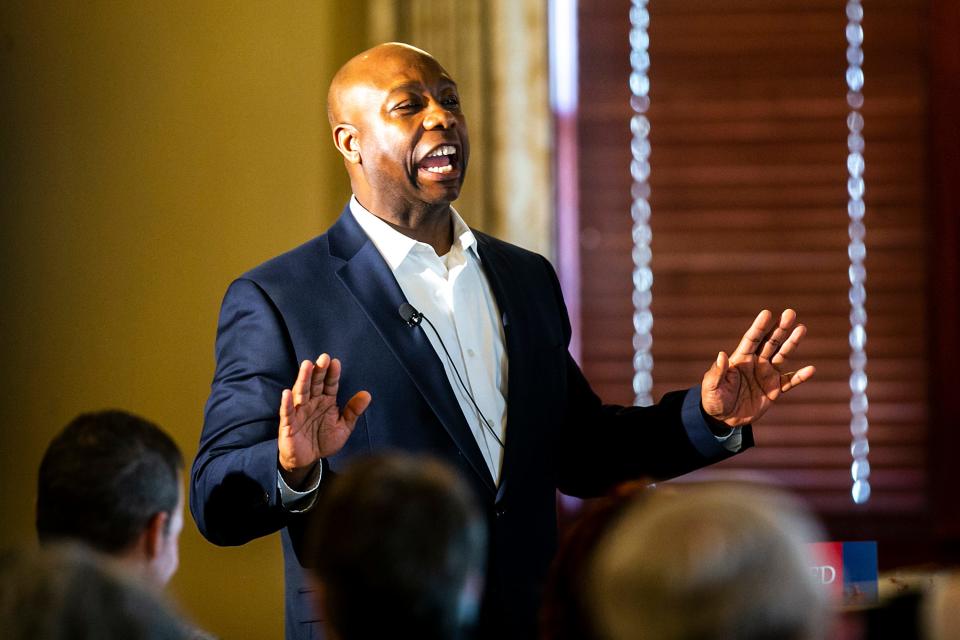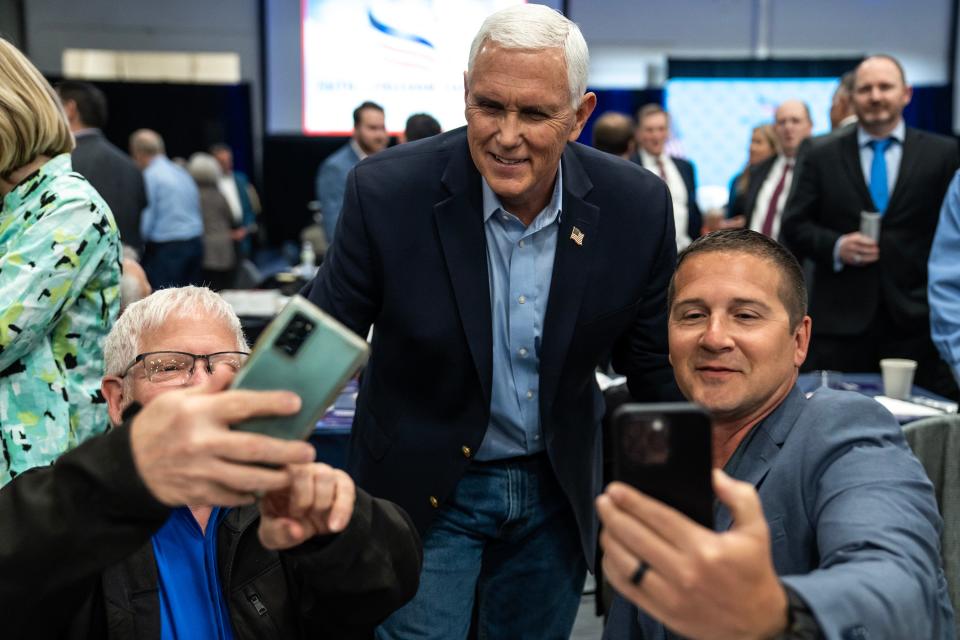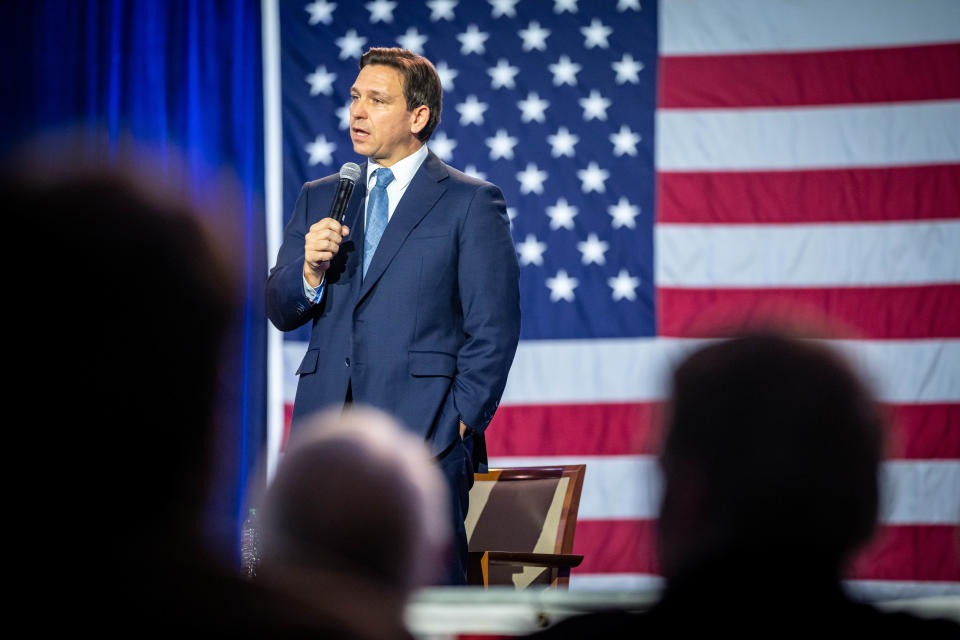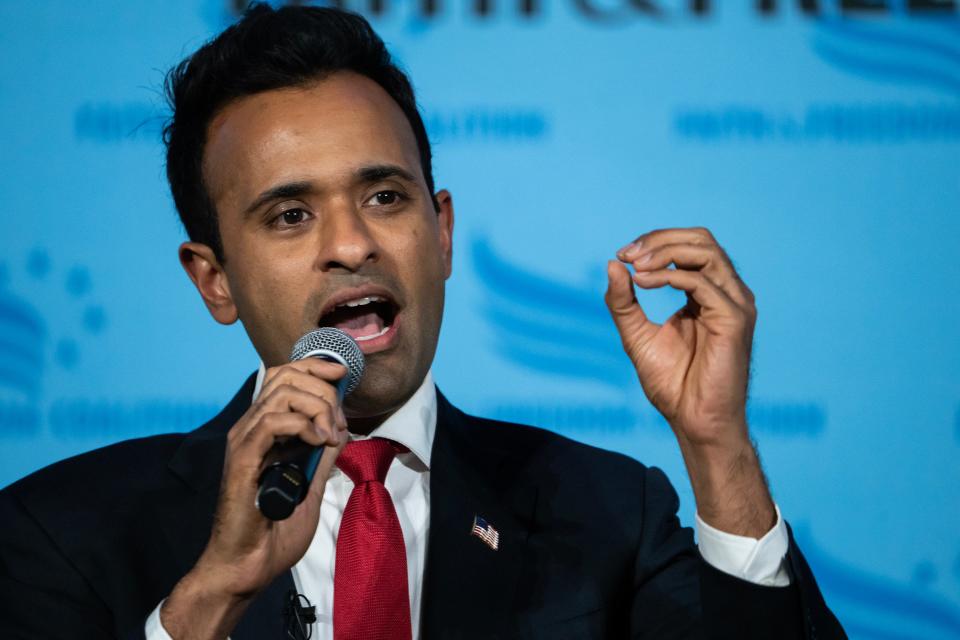Republican presidential candidates woo Iowa's pivotal evangelicals to pry them away from Trump
- Oops!Something went wrong.Please try again later.
- Oops!Something went wrong.Please try again later.
- Oops!Something went wrong.Please try again later.
- Oops!Something went wrong.Please try again later.
- Oops!Something went wrong.Please try again later.
- Oops!Something went wrong.Please try again later.
Des Moines Pastor Michael Demastus was meeting privately with U.S. Sen. Tim Scott and a group of other faith leaders earlier this year when Scott asked if he could pray over the group.
“He said he felt like being a pastor is the hardest calling in the world,” Demastus said. “And so that was really crazy. That was my first encounter with him, and I was really blown away by that.”
As a pastor and high-profile representative of Iowa’s deeply influential evangelical community, presidential campaigns routinely seek out Demastus, looking to make inroads with this key constituency.
That’s because these quiet moments of prayer and reflection have ripple effects that can shape the Iowa caucus landscape and help determine the nation’s next president.
A surge of support from evangelical caucusgoers tipped the scales in favor of U.S. Sen. Ted Cruz over Donald Trump during the 2016 Iowa caucuses. And Iowa’s faith communities have helped propel candidates such as Pat Robertson, Mike Huckabee and Rick Santorum to caucus success for decades.
Declared and likely presidential candidates looking to re-create those wins are already laying the groundwork with Iowa’s evangelical leaders in behind-the-scenes meetings as they seek to build early relationships that could pay big dividends on caucus night.
Demastus, who is a pastor at the Fort Des Moines Church of Christ, said he has had a chance to pray with Scott and Florida Gov. Ron DeSantis already this caucus cycle, and he’s previously prayed with former Vice President Mike Pence.
He said the meetings help him get to know a person and what their values are, and he expects he’ll be able to pray with the rest of the burgeoning 2024 field by Caucus Day.
“Prayer is a very intimate thing,” he said. “And it’s an important thing.”

Can a Republican win the Iowa caucuses without evangelical backing?
Evangelicals and born-again Christians typically show up to caucus in above-average proportions, making up well over half the electorate.
In 2016, Cruz mobilized Iowa’s evangelical base, painstakingly recruiting pastors in each of Iowa’s 99 counties to support the campaign. Evangelicals made up 64% of Republican caucusgoers in 2016, according to caucus entrance polling, and they supported Cruz over Trump 34% to 22% — a 12 percentage-point margin.
“I don’t believe that you can put together enough of a coalition to (win the Iowa caucuses) without evangelical support,” said Republican operative Eric Woolson, a veteran of six Iowa caucus campaigns, including Huckabee’s winning effort in 2008.
That year, Huckabee claimed a surprising upset by harnessing the evangelical vote.
To win over evangelicals this time around, candidates will need to talk about high-profile issues such as abortion, religious freedom and what kids are being taught in classrooms and about the LGBTQ community, leaders say.
But Drew Klein, a Republican operative who led faith outreach for Michele Bachmann’s 2012 Iowa caucus campaign, said it’s important for candidates to go beyond the talking points and show they’re able to speak the language of faith and demonstrate a genuine conviction of principle.
“I think that's the difference within that evangelical voter base,” he said. “Those issues become really important, and the way that candidates talk about them really kind of informs voters on how deep those roots go.”
Iowa evangelical leaders wrestle with complicated feelings about Donald Trump ahead of 2024 caucuses
Demastus, the Des Moines pastor, said that in 2016 he was wary of Trump’s past record on abortion and had concerns about his personal character. After supporting Cruz in the caucuses, Demastus “held (his) nose” and voted for Trump in the general election, despite his opposition.
Today, his feelings are more complicated. Like many evangelicals, Demastus was pleased to see Trump follow through on promises to move the U.S. Israeli embassy to Jerusalem and to appoint conservative justices to the U.S. Supreme Court, paving the way for the reversal of Roe v. Wade's legalization of abortion nationwide.
“For evangelicals, you know, we look at that, and it's like, wow,” Demastus said. “He became and still is, to this day, the most pro-life president that has ever been. That's just the reality.”
A Trump campaign official said Trump will run on his record of results in courting Iowa evangelicals.
"We have a record of achievements that resonate with this really important group of folks," the official said, pointing to federal judicial appointments, not just the Supreme Court, and issues such as transgender people competing in women's sports. "Those are all issues that the president continues to lead on."
But after a disappointing 2022 midterm for Republicans, Demastus faults Trump for elevating bad candidates. And he was angry that Trump then blamed the lackluster results on anti-abortion Republicans.
Later, Trump accused evangelical leaders of “disloyalty” for not immediately backing his 2024 reelection efforts.
“He's shooting us literally in the kneecaps,” Demastus said. “We're the people that are supposed to be turning out for this man. And so he is a really odd duck, you know what I mean? And so for us in the evangelical community, that's why many of us are like, ‘Yeah, let's look at some other guys.’”
More: Donald Trump to hold Des Moines rally on same day Ron DeSantis heads to Iowa
Terry Amann, who is a pastor at Church of the Way in Des Moines, said Trump has held on to a broad base of support among Iowa evangelicals.
“If he can extract himself from the legal morass that he's in, he'll be a force to be reckoned with,” Amann said. “But it just remains to be seen how that's all going to go.”
According to a March Des Moines Register Iowa Poll, Trump was viewed favorably by 58% of evangelicals and unfavorably by 39%. Another 3% were not sure.
Amann said Trump, who campaigned in Iowa during the 2016 caucus cycle and the 2020 general election, is running a more sophisticated operation than most — an important tool that helps reach potential supporters and turn them out on caucus night.
“I would say they've learned from the first and second go-around,” Amann said. “I'd say they're very highly organized and structured, and I think they'll be impressive.”
Other evangelical leaders, such as the Rev. Cary Gordon of Cornerstone Church in Sioux City, are more staunchly opposed to Trump.
He points to Exodus 18:21, which says leaders should be trustworthy, capable men who fear God and reject greed. He doesn't believe Trump meets that standard.
“When you look at those four things, you know, that's what I would expect out of a kindergarten teacher,” Gordon said. “I would train my children to live like this. And I would never turn over the nuclear codes to someone who doesn't meet these four basic plumb-line levels of having some moral strength. But Americans seem real, I'll use the word ‘hellbent’ on playing the game of lesser evil-ism.”
Gordon said he’s frustrated when others in the evangelical community put their support behind Trump, but he understands that “they’re terrified of what they perceive to be the greater evil on the other side of the ticket” and sympathizes with them.
He used to be the same way, he said. But as he’s gotten older, Gordon said he’s realized he was being too subjective when it comes to elections.
Now, Gordon said he encourages people to vote for a third party when one of the two major party candidates can’t live up to that biblical standard.
“You've got a write-in blank. Use it and keep your conscience right,” he said. “I know it doesn't please a particular party, but it pleases God. And so I sleep good at night knowing I haven't violated my conscience when I went in to vote.”
He said he's open to other Republican candidates, and he'll wade through the field and learn about them just like other Iowa caucusgoers. But as campaigns reach out, he'll have another decision to make.
"As a minister, I have to ask myself, 'Should I keep this private and just support the guy that I think is probably OK? Or does this candidate meet the level where I stick my neck out and endorse them publicly?'" he said. "And that's a whole other issue."
Can candidates like Pence, DeSantis or Scott 'close the sale' with Iowa's evangelical base?
Social conservative leader Bob Vander Plaats, president of The Family Leader, said polling and enthusiasm at early caucus events indicate an appetite among Iowans to hear from candidates other than Trump.
“But it's going to be up to a DeSantis or up to a Mike Pence or a Nikki Haley or a Vivek Ramaswamy or a Tim Scott to close the sale on why it should be them,” he said.
More: Republican presidential candidates want Iowa to ditch Trump. Will voters listen?
Scott has made his faith central to his early pitch to Iowans, labeling his early stops the “Faith in America” tour.
“Most pastors are not very political, but he's meeting with some of those that have a lot of influence,” said Steve Scheffler, president of the Iowa Faith & Freedom Coalition. “Not that that's the only piece of the puzzle, but that's a smart move on his part.”

Pence has also been holding private meetings with pastors as he’s traveled to Iowa over the years. And he’s hired Chip Saltsman, who ran Mike Huckabee’s 2008 presidential campaign, as a senior adviser to his nonprofit group. Saltsman has an Iowa call list he routinely checks in on as Pence prepares a likely presidential run.
Klein, the Republican operative who worked for Bachmann, said it can help to win over support if campaigns have trusted staffers who can reach out to the evangelical community and speak the same language.
“’The personnel is politics’ certainly rings true with evangelical voters,” he said.
According to the March Iowa Poll, Pence was about on par with Trump with evangelicals. The former vice president was viewed favorably by 58% and unfavorably by 38%, with another 4% who were not sure.

DeSantis was viewed more favorably, but more people hadn’t made up their minds about him.
According to the poll, DeSantis was viewed favorably by 63% of evangelicals — the highest favorable rating of four candidates tested — and he was viewed unfavorably by 15%. But nearly a quarter, 23%, didn’t know enough to say.
Haley, the former governor of South Carolina, is airing ads in Iowa highlighting her abortion stance.
“As a state legislator, I voted for every pro-life bill that came before me,” she says in the ad. “As governor, we passed the Born-Alive Infant Protection Act. Pro-life political leaders and candidates must not put up with being demonized. They are acts of division and hatred.”
Haley was viewed favorably by a smaller share of evangelicals at 44%, and was viewed unfavorably by 15%. Another 41% were not sure.
The poll did not ask about Scott and Ramaswamy.

Ramaswamy, an entrepreneur who has built a reputation around criticizing “woke” politics, is Hindu. But during his next trip to Iowa, he is meeting privately with about 50 pastors, his campaign said.
“Vivek Ramaswamy is going to be a little bit of a harder sell for evangelicals,” said Demastus, the Des Moines pastor. “He's a Hindu, but he is saying some really incredible things that have us like, 'Heck yeah, I like what you're saying.'”
At the Faith & Freedom Coalition's forum in April, Ramaswamy told the Register that even though he's not Christian, he and his family live a life "grounded in moral conviction."
"I think we're going to do very well with the evangelical Christian audience, actually, because we're building a level of trust through our authenticity about what faith means to us than somebody who is nominally Christian but tries to pretend like something they're not," he said. "I think they can tell the difference."
Editor's note: A previously published version of this story incorrectly listed the location of the Church of the Way. It is in Des Moines.
Des Moines Register political reporter Galen Bacharier contributed to this report.
Brianne Pfannenstiel is the chief politics reporter for the Register. Reach her at bpfann@dmreg.com or 515-284-8244. Follow her on Twitter at @brianneDMR.
This article originally appeared on Des Moines Register: Can GOP presidential candidates pry Iowa evangelical voters from Trump?

